Table of Contents
- Is Welding a Blue Collar Job?
- The Versatility of Welding: From Artistry to Precision
- The Demand for Welders: Building the World
- Training and Education: Forging a Path to Success
- Career Progression: From Novice to Expert
- Breaking Stereotypes: Welding and Gender Diversity
- Are welders blue-collar
- Can Welding Be a Lucrative Career Choice?
- Are There Health Risks Associated with Welding?
- What Industries Can Welders Work In?
- Is Automation a Threat to Welding Jobs?
- How Can I Ensure Welding Job Safety?
- Exploring the Future of Welding: Innovations and Challenges
- Welding and Sustainability: A Greener Approach
- The Role of Soft Skills: Communication and Collaboration
- Welding and Artistry: Sculpting Imagination
- Embracing the Journey: The Future of Blue Collar Professions
- Get Involved: Becoming a Part of the Welding Community
- A Lasting Impression: Leaving Your Mark as a Welder
- Embrace the Sparks: Your Welding Adventure Awaits
- What is Considered a Blue-Collar Job?
- Conclusion: A Fusion of Skill and Opportunity
- FAQ about is a welder a blue collar job
Is welding a blue-collar job? Yes, welding is often classified as a blue-collar job due to its hands-on nature. However, there’s more to welding than just this label. This guide delves into different aspects of welding to determine if it’s solely a typical blue-collar job or if it offers broader opportunities.
In this detailed exploration, we’ll examine the world of welding, including its significance, required skills, career prospects, and impact across various industries.
Whether you’re considering a career in welding or simply interested in blue-collar professions, this article provides insight into the art and craftsmanship of welding.
Is Welding a Blue Collar Job?
Yes, welding is commonly considered a blue-collar job. Blue-collar jobs typically involve manual labor and are often associated with industries such as manufacturing, construction, and skilled trades.
Welding fits this category as it requires specialized skills, physical agility, and the ability to work with various metals to join them together using heat and sometimes pressure.
Workers in welding typically perform their duties in workshops, factories, construction sites, or other industrial settings.
The Versatility of Welding: From Artistry to Precision
Welding isn’t just about joining two pieces of metal. It’s a blend of artistry and precision. Various techniques, such as arc welding, metal inert gas (MIG) welding, and tungsten inert gas (TIG) welding, require different skills and expertise.
Welders utilize these techniques to create structures, repair machinery, and even craft intricate sculptures. The versatility of welding extends to its applications in creating everything from towering skyscrapers to delicate artwork.
The Essential Skills of a Welder
Becoming a proficient welder requires a combination of technical skills and innate qualities. Attention to detail, hand-eye coordination, and the ability to interpret complex blueprints are crucial for success in this field. Manual dexterity is essential when handling intricate welding tasks.
Moreover, understanding metallurgy and the behavior of different metals under heat is fundamental for producing solid and durable welds. Welders must also be well-versed in safety protocols, as working with high temperatures and potentially hazardous materials is expected.
The Demand for Welders: Building the World
The demand for skilled welders remains steadfast, making welding a promising career path. Industries like construction, manufacturing, and energy generation heavily rely on welders to create and maintain structures.
As infrastructure projects thrive, the need for qualified welders grows exponentially. Repairing and maintaining machinery and equipment in various sectors amplifies the demand for welding expertise.
Training and Education: Forging a Path to Success
While some may assume that blue-collar jobs require no formal education, becoming a skilled welder necessitates training and education. Trade schools and vocational programs offer comprehensive courses that cover welding techniques, safety procedures, and metallurgical principles.
Apprenticeships under experienced welders provide hands-on learning opportunities and mentorship. Additionally, obtaining certifications from reputable organizations like the American Welding Society (AWS) enhances a welder’s credibility and opens doors to better job opportunities.
Career Progression: From Novice to Expert
Starting as a novice welder, one can progress through various career stages to become an expert in the field. Novices often begin with basic tasks, gradually honing their skills in different welding techniques.
With experience, welders can specialize in specific areas, such as underwater or aerospace welding. Those with exceptional skills might ascend to supervisory roles, overseeing teams of welders and managing projects. The journey from novice to expert welder is a testament to dedication and continuous learning.
Breaking Stereotypes: Welding and Gender Diversity
The perception of welding as a male-dominated field is rapidly changing. Women are increasingly entering the welding profession, shattering stereotypes and contributing their skills to the industry.
Organizations are actively promoting gender diversity, emphasizing that welding expertise is not limited by gender. As more women pursue welding careers, the industry benefits from a broader range of perspectives and talents.
Are welders blue-collar
Welders are skilled professionals who join metals using heat and are often considered blue-collar workers due to their hands-on nature. However, their technical expertise, training, and versatility in various industries make their classification more nuanced.
Can Welding Be a Lucrative Career Choice?
Absolutely. Skilled welders are in high demand, allowing for competitive compensation. Moreover, experienced welders who specialize in complex techniques or challenging environments often command premium wages.
Are There Health Risks Associated with Welding?
Welding has some health risks, primarily related to exposure to fumes, gases, and intense light. Wearing proper protective gear, working in well-ventilated areas, and following safety protocols mitigate these risks significantly.
How Can I Start a Welding Career?
Consider enrolling in a reputable trade school or vocational program to start a welding career. Seek apprenticeships to gain hands-on experience and obtain certifications to bolster your credentials. Networking with experienced welders can also provide valuable insights and opportunities.
What Industries Can Welders Work In?
Welders work in diverse industries, including construction, manufacturing, automotive, aerospace, shipbuilding, and even art. The skills acquired in welding are highly transferable, allowing for flexibility in career choices.
Is Automation a Threat to Welding Jobs?
While automation has impacted some industries, skilled welders are in demand for tasks requiring intricate detail and adaptability. Automation complements welding by handling repetitive tasks, enabling welders to focus on complex projects.
How Can I Ensure Welding Job Safety?
Prioritize safety by wearing appropriate protective gear, including helmets, gloves, and goggles. Ensure proper ventilation in your workspace to reduce exposure to fumes. Adhere to safety guidelines and participate in ongoing training to stay updated on best practices.
Exploring the Future of Welding: Innovations and Challenges
As technology advances, so does the field of welding. Automation and robotics have made their way into welding processes, streamlining production and enhancing efficiency.
Welding robots are programmed to perform repetitive tasks with unparalleled precision, allowing human welders to focus on complex and creative aspects.
This fusion of human expertise and technological innovation is reshaping the landscape of welding.
However, with these advancements come challenges. The need for welders to adapt to new technologies and acquire digital skills is becoming more prominent. Welders must embrace a continuous learning mindset to stay relevant in an ever-evolving industry.
Automation’s potential displacement of specific traditional welding tasks also underscores the importance of diversifying skill sets and exploring specialized niches.
Welding and Sustainability: A Greener Approach
In an era of heightened environmental consciousness, welding also strives toward sustainability. Welding techniques are being optimized to minimize energy consumption and reduce waste.
Innovations in materials and processes are contributing to greener practices. For instance, advancements in laser welding require less heat input, reducing energy consumption and fewer emissions. Welders are becoming key players in crafting a more sustainable future.
The Role of Soft Skills: Communication and Collaboration
Welding isn’t solely about technical prowess; soft skills like communication and collaboration are also vital. Welders often work in teams on construction sites or manufacturing facilities.
Effective communication ensures tasks are executed smoothly, and collaborative efforts lead to successful project outcomes. The ability to understand and interpret complex instructions and work harmoniously with colleagues underscores the holistic nature of the profession.
Welding and Artistry: Sculpting Imagination
Beyond its industrial applications, welding has also found its place in the world of art. Welders with technical expertise and artistic flair create stunning sculptures, installations, and intricate pieces of functional art.
The fusion of metalwork and artistic vision has opened new avenues of creativity, blurring the lines between traditional craftsmanship and contemporary artistry.
Embracing the Journey: The Future of Blue Collar Professions
The concept of blue-collar jobs is evolving, shedding outdated stereotypes and embracing the dynamic nature of work. Welding is a beacon of this transformation, exemplifying the fusion of skill, expertise, and opportunity.
Whether you’re drawn to craftsmanship, intrigued by technological advancements, or excited by the potential for creativity, the world of welding offers a multitude of pathways to explore and succeed.
Get Involved: Becoming a Part of the Welding Community
If the world of welding intrigues you, consider getting involved in the welding community. Attend industry conferences, workshops, and trade shows to connect with fellow professionals, learn about the latest advancements, and broaden your horizons.
Engaging with online forums, social media groups, and networking events can provide valuable insights and opportunities for growth.
A Lasting Impression: Leaving Your Mark as a Welder
As you journey through the world of welding, remember that every weld leaves an imprint, whether a structural connection supporting a skyscraper or a finely crafted piece of art. The legacy of welders extends beyond the physical; it’s a testament to dedication, skill, and the contributions that shape the world around us.
Embrace the Sparks: Your Welding Adventure Awaits
In conclusion, the question “Is welding a blue-collar job?” finds its answer in the rich tapestry of the profession. Welding is not just a job. It’s a craft that requires expertise, precision, and creativity.
As industries evolve and technology advances, the role of welders remains irreplaceable.
So, if you’re considering a career that combines hands-on skill, technical know-how, and boundless opportunity, embrace the sparks and embark on a welding adventure that promises a future of innovation and fulfillment.
Remember, welding is vast and diverse, offering a learning, growth, and contribution journey.
Whether you’re drawn to the artistry, enticed by the challenges, or captivated by the potential for a sustainable future, welding invites you to join its ranks and leave your mark in the world of craftsmanship and creation.
What is Considered a Blue-Collar Job?
Blue-collar jobs encompass a wide range of occupations that involve manual labor, skilled trades, and hands-on work.
These roles typically require physical effort and are often associated with industries such as manufacturing, construction, maintenance, and technical services. Individuals in blue-collar professions work with their hands to create, build, repair, and maintain the tangible world around us.
Are Metal Workers Blue-Collar?
Yes, metal workers are typically considered blue-collar professionals. Metal workers engage in physically demanding tasks that involve shaping, cutting, welding, and assembling metal components.
They contribute to industries like manufacturing, construction, and fabrication. Whether it’s crafting delicate sculptures or constructing sturdy infrastructure, metal workers play an essential role in these sectors.
Is Engineering a Blue-Collar Job?
Engineering itself is not typically classified as a blue-collar job. Engineering involves the application of scientific principles to design, develop, and innovate various technologies, systems, and structures.
Engineers often research, analyze, and solve problems to create solutions that drive progress across industries. While engineering may require hands-on work, it is generally considered a white-collar profession due to its focus on intellectual and technical aspects.
Is Engineering a White-Collar Job?
Yes, engineering is primarily categorized as a white-collar job. White-collar jobs are characterized by their emphasis on intellectual skills, professional expertise, and office-based work.
Engineers use their knowledge and analytical abilities to design, plan, and oversee projects, often working in offices, laboratories, and research centers.
While some engineering roles might involve site visits and hands-on tasks, the overall nature of engineering is aligned with white-collar work due to its technical complexity and reliance on specialized knowledge.
Conclusion: A Fusion of Skill and Opportunity
In the blue-collar professions, welding is a prime example of a meeting opportunity. The art of welding, rooted in craftsmanship and precision, holds immense value across industries.
From constructing towering buildings to sculpting intricate artwork, welders play an indispensable role. As the demand for skilled professionals continues to rise, welding is a gateway to a fulfilling and prosperous career.
FAQ about is a welder a blue collar job
Is welding a physically demanding job?
Welding requires physical exertion but also relies significantly on skill and precision.
Can I pursue further education or specialization in welding?
Absolutely! There are numerous certification programs and opportunities for specialization in welding.
Are there risks associated with welding?
Yes, there are risks related to exposure to fumes, high temperatures, and equipment. Proper safety measures are crucial.
What industries commonly employ welders?
Welders find opportunities in construction, manufacturing, automotive, aerospace, and more.
How does technology impact the future of welding?
Advancements like robotics and automation are transforming the field, creating new avenues for skilled welders.

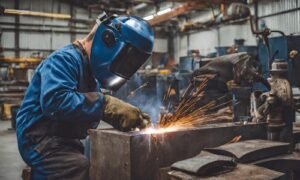
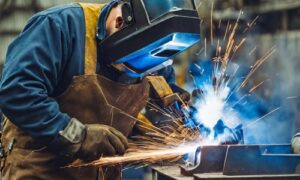
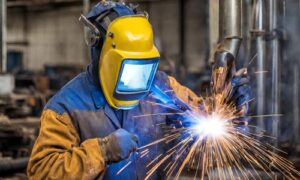
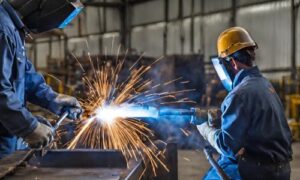
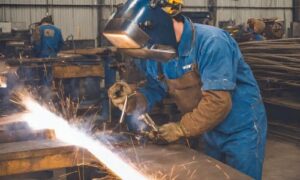
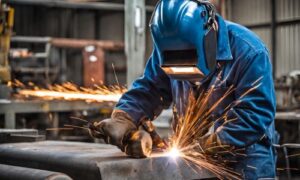
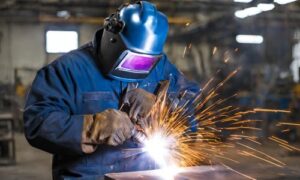








2 thoughts on “Is Welding a Blue Collar Job?”